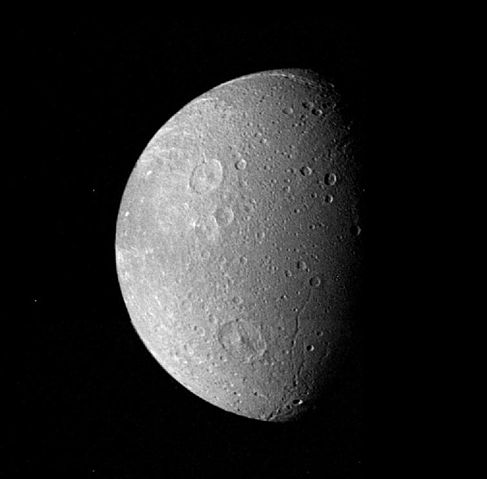 |
This is a file from the Wikimedia Commons. Information from its description page there is shown below.
Commons is a freely licensed media file repository. You can help.
|
Summary
| Description |
This picture of Dione was take by Voyager 1 from a range of 162,000 kilometers on November 12, 1980. Many impact craters -- the record of the collision of cosmic debris -- are shown, the largest crater is less than 100 kilometers (62 miles) in diameter and shows a well-developed central peak. Bright rays represent material ejected from other impact craters. Sinuous valleys probably formed by faults break the moon's icy crust. |
| Date |
12 November 1980 |
| Source |
http://www.nasa.gov/ |
| Author |
This file is lacking author information.
|
Permission
( Reusing this file) |
| Public domainPublic domainfalsefalse |
 |
This file is in the public domain because it was solely created by NASA. NASA copyright policy states that "NASA material is not protected by copyright unless noted". (See Template:PD-USGov, NASA copyright policy page or JPL Image Use Policy.) |
|
|
|
Warnings:
- Use of NASA logos, insignia and emblems are restricted per US law 14 CFR 1221.
- The NASA website hosts a large number of images from the Soviet/ Russian space agency, and other non-American space agencies. These are not necessarily in the public domain.
- Materials based on Hubble Space Telescope data may be copyrighted if they are not explicitly produced by the STScI. See also {{ PD-Hubble}} and {{ Cc-Hubble}}.
- The SOHO (ESA & NASA) joint project implies that all materials created by its probe are copyrighted and require permission for commercial non-educational use.
- Images featured on the Astronomy Picture of the Day (APOD) web site may be copyrighted.
|
|
File usage
The following pages on Schools Wikipedia link to this image (list may be incomplete):
SOS Children chose the best bits of Wikipedia to help you learn. SOS Children is there for the children in our care until they are ready for independence. Would you like to sponsor a child?





